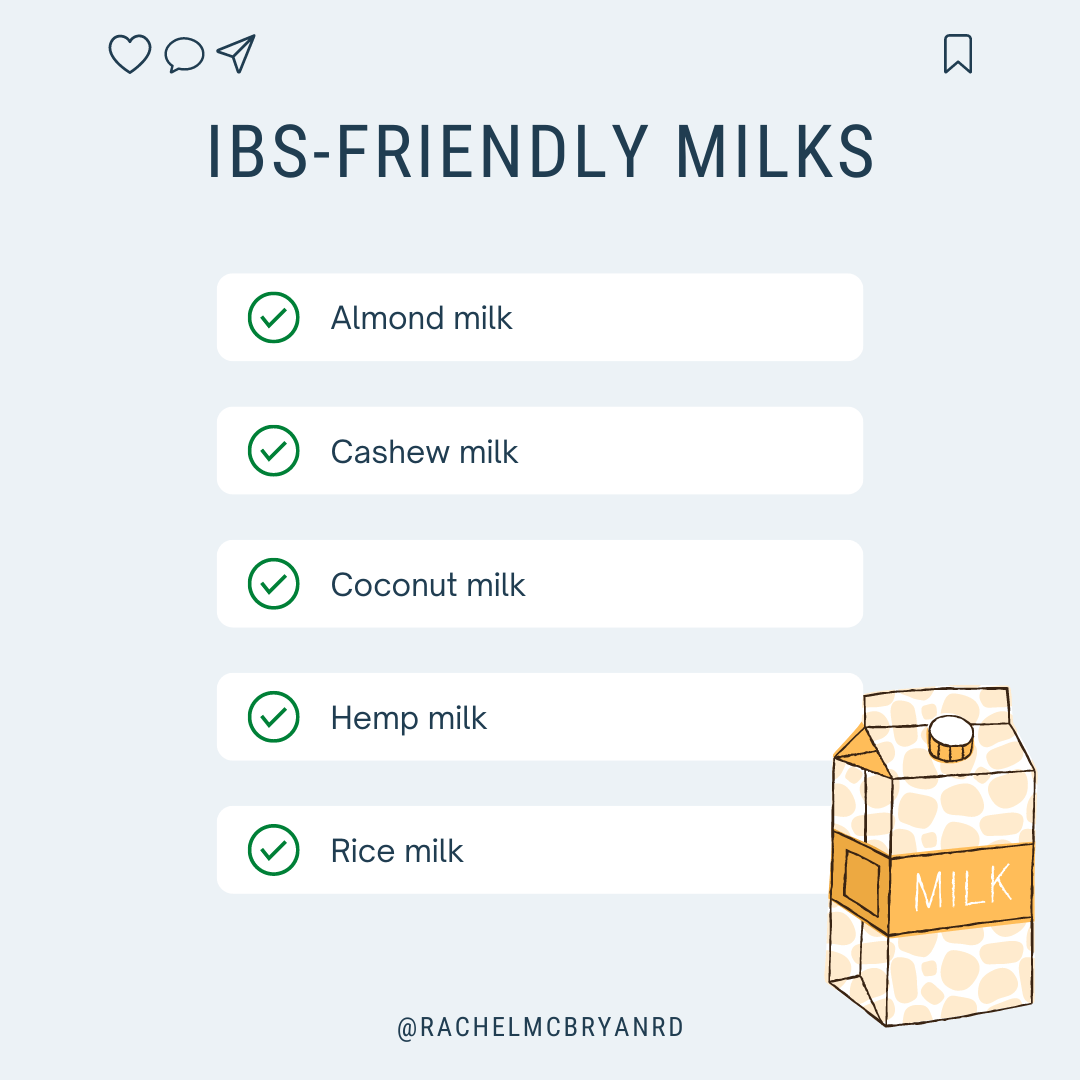Written by Kimberley Gittens, RD on behalf of Rachel McBryan, RD
Milk and many dairy products are common triggers for many people with IBS. These products are found in many recipes, particularly in baking, which can lead to eliminating these foods, and recipes, from your diet to help manage symptoms.
However, following a restrictive diet can be frustrating, and outright overwhelming. Can you eat your favourite recipe? Will you have choices at the family potluck? Does the restaurant have any IBS-friendly options?
Being aware of low-FODMAP alternatives to traditional ingredients, such as milk, can help you include more recipes in your diet while managing your IBS symptoms. When it comes to milk, there is an increasing number of low-FODMAP options to you can try.
Low FODMAP Milk Options
When it comes to milk, there is an increasing number of low-FODMAP options you can try including,
-
- Almond milk
- Coconut UHT milk
- Soy milk made from ‘hulled’ soy beans
- Hemp Milk
- Quinoa milk
- Rice milk
- Cashew milk

Low FODMAP Soy Products
Soy products are made from either soybeans or soy protein extract. Soy milk made from soy protein extracts tends to be lower in FODMAPs than soy milk made from soybeans. On the other hand, milk made from soybeans has higher amounts of galacto-oligosaccharides, which contributes to their higher FODMAP content.
Some IBS-friendly soy products include Silk soy milk and Natura soy beverages.
Cashew Milk
Although cashew nuts are high in FODMAPs, cashew milk can be included in a low FODMAP diet. Despite being made from cashews, there is a very small amount of the nut in the milk, which allows it to be classified as low-FODMAP.
There are many types of cashew milk to choose from at your local supermarket. You can find unsweetened options such as Elmhurst Unsweetened Cashew Milk and flavoured options such as So Delicious Organic Vanilla Coconut Milk.
Rice Milk
Rice milk is another low-FODMAP alternative for an IBS-friendly diet! In 2016, rice milk was moved from the red FODMAP category to the green (low) FODMAP category for servings under 200 mL. Despite being in the green category, some types of rice milk contain fructans, which can trigger IBS symptoms when consumed in large amounts.
IBS-Friendly Creamers
In addition to milk, there are also a few IBS-friendly creamers available to enjoy in your coffee, tea or recipes. Coffee Mate’s Natrual Bliss Almond Milk Creamer is a good option to try if you are following a low-FODMAP diet, or are simply limiting your FOMDAP intake.
Low-FODMAP Cheese
Cheeses typically contain lactose, and when consumed in large amounts, can trigger your IBS symptoms. However, not all cheeses are made equal. Some cheeses have less lactose than others due to the ageing process. As a general rule of thumb, aged cheeses have lower amounts of lactose. This makes them easier to include in an IBS-friendly diet.
Despite containing lactose, there are a variety of low FOMDAP cheeses that you can enjoy, including:
-
- Brie
- Cheddar
- Havarti
- Monterey Jack
- Swiss cheese
- Ricotta
- Feta
- Cottage cheese
- Cream cheese

Low FODMAP Yogurt
Yogurts are a great source of probiotics, and essential vitamins and minerals. However, they are another common source of FODMAPs in our diet. Choosing a low FODMAP yogurt can help you reduce your GI symptoms, while continuing to enjoy the benefits of yogurt.
Some low FODMAP options include:
Serving Size
Knowing the serving size of low-FODMAP foods is important in preventing unwanted GI symptoms. Many foods that are classified as “low-FODMAP”, can still trigger GI symptoms when consumed in large amounts. Knowing the “low-FODMAP” serving size of foods, including milk, can help you gauge the amount to include in your IBS-friendly diet, and manage your symptoms.
Building IBS-Friendly Breakfasts
Many breakfast dishes include high-FODMAP foods, leading many people with IBS to skip breakfast. Identifying and limiting high-FODMAP breakfast foods can help you start your day off on the right foot, and provide your body with the energy you need to start the day.
Check out the article for tips on building an IBS-friendly breakfast!
Get Help Identifying Your IBS-Triggers
Identifying your IBS triggers allows you to eliminate them from your diet, and prevent flares up and post-meal discomfort. Book a FREE discovery call today to learn more about working with a Registered Dietitian to manage your IBS!
References
High and Low FODMAP Foods. (n.d.). Monash University. Retrieved January 4, 2023, from https://www.monashfodmap.com/about-fodmap-and-ibs/high-and-low-fodmap-foods/
Mcnamara, L. (2017, January 17). Lactose and dairy products on a low FODMAP diet. Monash University FODMAP Blog. https://www.monashfodmap.com/blog/lactose-and-dairy-products-on-low/
Muir, J. (2016, May 15). Rice milk and the low FODMAP diet. Monash University FODMAP Blog. https://www.monashfodmap.com/blog/rice-milks-revisited-moving-from-red-to/
Tuck, C., Ly, E., Bogatyrev, A., Costetsou, I., Gibson, P., Barrett, J., & Muir, J. (2018). Fermentable short chain carbohydrate (FODMAP) content of common plant-based foods and processed foods suitable for vegetarian- and vegan-based eating patterns. Journal of Human Nutrition and Dietetics, 31(3), 422–435. https://doi.org/10.1111/JHN.12546
Yao, C. (2016, January 6). Milk alternatives on a low FODMAP diet. Monash University FODMAP Blog. https://www.monashfodmap.com/blog/milk-alternatives/
Kimberley is a Registered Dietitian, licensed in Ontario. She helps clients across Ontario control their blood sugars and reduce their risk of chronic conditions.


